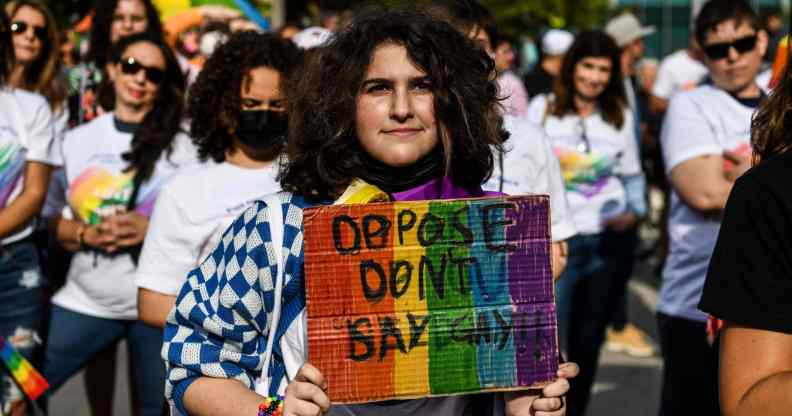Lawsuit filed against Florida’s hateful and reviled Don’t Say Gay law: ‘It puts students at risk’

Since its proposal, the reviled ‘Don’t Say Gay’ bill has faced pushback from those it would impact the most. (AFP via Getty Images/HANDAN KHANNA)
Families and LGBTQ+ campaign groups have filed a federal lawsuit to block the controversial ‘Don’t Say Gay’ law in Florida.
Under the law, which went into effect in July, public school teachers are not allowed to “encourage classroom discussion about sexual orientation or gender identity in primary grade levels”.
But a suit filed Monday (25 July) argues that the law is unconstitutional as it violates the First Amendment.
“Florida enacted HB 1557 to silence and erase lesbian, gay, bisexual, transgender, queer and questioning young people and families,” the 53-page lawsuit said. “The law is profoundly vague and requires schools to ban undefined broad categories of speech, based on undefined standards such as ‘appropriateness.'”
The complaint was filed in the US District Court for the Middle District of Florida and seeks to stop school boards in Orange, Indian River, Duval and Palm Beach counties from carrying out the bill.
Given the vague wording of the law, school officials have carried out the policy in various ways.
The suit names Orange County and Palm Beach County districts as removing LGBTQ+ books from library shelves, while Palm Beach County has ordered teachers to conduct a review into what LGBTQ+ materials are “age-appropriate”. Others have cut anti-bullying guidance for LGBTQ+ young people.
The language of the bill tends to focus on young students, restricting any mention of sexuality or gender identity between kindergarten and third grade. After third grade, these topics must be “age appropriate”.

Ron DeSantis signed the ‘Don’t Say Gay’ bill in March in the face of fierce opposition. (Joe Raedle/Getty Images)
But because the state has not issued standards on what exactly is “age-appropriate”, the complainants fear that the law could easily be taken too far.
“This vigilante enforcement mechanism, combined with the law’s intentionally vague and sweeping scope, invites parents who oppose any acknowledgement whatsoever of the existence of LGBTQ+ people to sue, resulting in schools acting aggressively to silence students, parents and school personnel,” the lawsuit said.
“The law, by design, chills speech and expression that have any connection, however remote, to sexual orientation or gender identity.”
Plaintiffs include two families with children as young as six and as old as 12. “This law will prevent our two youngest children, rising first and third graders, from discussing their older non-binary sibling in the classroom for fear of their teacher or their school getting in trouble,” said plaintiffs Jennifer and Matthew Cousins.
“The law also robs them of the opportunity of discussing their family like other non-LGBTQ+ children. It’s heartbreaking to know that my children may be bullied because this law paints our family as shameful. Every child deserves the right to celebrate their family in the form that it exists.”
The lawsuit is being bolstered by Lambda Legal, the Southern Poverty Law Center and the Southern Legal Counsel.
House Bill 1557 is a bill of two names. To its backers, it’s the “Parental Rights in Education” bill. Its critics call it the “Don’t Say Gay” bill.
And it has many critics, from the White House to Disney to Hollywood celebrities. Yet governor Don DeSantis nevertheless signed the bill in March, one he said will prevent children from being “indoctrinated”.
The ‘Don’t Say Gay’ law’s reach goes far beyond LGBTQ+ topics, however. It also allows parents and guardians to opt-out of counselling and mental health services and even gives them thumping power to sue school districts for any perceived violations – and districts will have to cover the costs.
Above all, the law will take a deep toll on LGBTQ+ students the most.
“This discriminatory law puts students at risk and sends a message of shame and stigma that has no place in schools,” said Kell Olson, Lambda Legal staff attorney.

